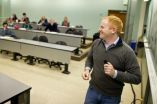(Press-News.org) COLUMBUS, Ohio – In a recent survey of pharmacy professors, 100 percent of the respondents who had Facebook profiles said they would not send friend requests to their current students.
Just fewer than half of the responding faculty members had a Facebook profile, and of those, most said they also ignored friend requests from students – especially current students.
It was a small study, with 95 faculty members from colleges of pharmacy at four Ohio institutions participating. But it is among the first studies to examine college professors' use of the social network, especially with respect to how they interact with students online.
Though the study was limited to pharmacy schools, senior author James McAuley, associate professor of pharmacy practice and neurology at Ohio State University, said the findings have potential to be applicable to other disciplines.
"I would imagine that if faculty members in other colleges got requests from students, the same questions might go through their minds," he said.
The study was designed primarily to document whether and how faculty use Facebook. But because respondents are divided on the subject, the researchers suggest that faculty might benefit from attempts to reach consensus among their department and college colleagues about the appropriate use of social networking.
"A clearly defined stance or consensus may decrease faculty members' concern or discomfort about how to handle a friend request from a student," the researchers wrote.
The study is published in a recent issue of the American Journal of Pharmaceutical Education.
The survey was launched after a former resident sought McAuley's advice about Facebook etiquette. Lead study author Anne Metzger, who teaches at the University of Cincinnati, received a Facebook friend request from a student. She called McAuley to ask for guidance on how to react to the request.
"At the time she was a relatively new faculty member, and she wanted to learn from her more senior peers," McAuley said. "That was the premise of doing a broader survey."
McAuley and Metzger joined with two other Ohio State pharmacy resident graduates, Kristen Finley at Ohio Northern University and Timothy Ulbrich at the Northeastern Ohio Universities Colleges of Medicine and Pharmacy, to survey the pharmacy faculty at all four institutions.
The researchers distributed surveys to 183 full-time pharmacy faculty, and received 95 responses – a 52 percent response rate. Among those who responded, 44 professors (46 percent) had Facebook profiles, and 51 (54 percent) did not. The longer the respondents had been on the faculty, the less likely they were to have Facebook pages: Those with Facebook profiles had been faculty members for an average of 8.6 years, vs. 11.4 years of faculty status among those without Facebook profiles.
The most common reasons cited among faculty who did not use Facebook were lack of time or lack of interest in maintaining a profile.
Nearly four out of five faculty who did use Facebook were not friends with their students. Among those who were friends with students, 12 percent gave student friends access to their entire profile, while 9 percent gave student friends only limited access to their profile.
All respondents said they would not ask current students to be friends on Facebook, but a small minority said they would send a request to students who had graduated.
"My stance, along with everybody else, is that faculty should not reach out to current students on Facebook," McAuley noted. "But if I get a request from a student, I will accept their friendship."
Professors who did use Facebook were evenly divided about whether their faculty status presented a conflict with social networking sites. Those who thought being faculty members did pose a conflict typically reported that they try to maintain a line between personal and professional relationships with students.
Very few faculty had used Facebook for teaching purposes – one respondent had used it to initiate online discussions, and another used the network to provide information to students in experiential education courses. Four faculty members had used Facebook in connection with their roles as advisers to student organizations.
McAuley co-advises a large student organization at Ohio State's College of Pharmacy, and in that role, spends a lot of time with students. In addition, he participates in social activities designed to bring students and faculty together – for example, gathering for pizza and soft drinks or attending a sporting event.
"There is generally this desire for students and faculty to get to know each other outside the classroom, but some people might feel that even that blurs the line," said McAuley, who added that his Facebook use is personal rather than professional. "I don't see a big difference between participating in these social events and allowing a student to be a Facebook friend and see my post about my dog graduating from puppy training."
In general, previous research concerning social network use among college students suggests that because of the power differential between students and the professors judging their performance, students are the ones taking risks in the online relationship. McAuley said that in his experience, being Facebook friends with current and former students has not led to any surprise revelations that might influence his opinion of students.
"I would think most students are aware of the potential problems with putting something on their page that is inappropriate or unprofessional," he said. "If you're friends with a faculty member, then it's not a good idea to post pictures about getting drunk Friday night when on Monday morning, you have to go to a job interview or to a site as a student in a professional practice."
###
Contact: James McAuley, (614) 292-9713; mcauley.5@osu.edu
Written by Emily Caldwell, (614) 292-8310; caldwell.151@osu.edu
END
WEST LAFAYETTE, Ind. - The time students invest in rereading or reviewing their notes would be better spent practicing retrieval to ensure better learning, according to new research from Purdue University.
"We continue to show that practicing retrieval, or testing yourself, is a powerful, robust tool for learning," said Jeffrey D. Karpicke (pronounced CAR-picky), an assistant professor of psychological sciences who studies learning and memory. "Our new research shows that practicing retrieval is an even more effective strategy than engaging in elaborative studying.
"Educators, ...
BOSTON (January 24, 2011) — Genetics in Medicine, the official journal of the American College of Medical Genetics, published this month a paper by Tufts University faculty calling for a moderate, strategic approach to teaching personalized genomic testing in medical school curricula.
For 16 months, a multi-disciplinary group of Tufts University faculty examined ways to improve education regarding personalized genomic testing at Tufts University School of Medicine (TUSM). The genesis of the debate centered on whether medical students should use their own genome for ...
The genome of the fungus that helps mountain pine beetles infect and kill lodgepole pines has been decoded in a University of British Columbia study.
Also known as blue stain fungus for the stain it leaves in the wood of infected trees, Grosmannia clavigera is carried to the host trees by pine beetles and weakens the trees' natural defense system, allowing pine beetles to feed and reproduce in the tree bark. A successful beetle-fungus attack ultimately causes tree death.
Now, researchers from UBC and the BC Cancer Agency's Genome Sciences Centre have conducted a detailed ...
MADISON — Future queen or tireless toiler? A paper wasp's destiny may lie in the antennal drumbeats of its caretaker.
While feeding their colony's larvae, a paper wasp queen and other dominant females periodically beat their antennae in a rhythmic pattern against the nest chambers, a behavior known as antennal drumming.
The drumming behavior is clearly audible even to human listeners and has been observed for decades, prompting numerous hypotheses about its purpose, says Robert Jeanne, a professor emeritus of entomology at the University of Wisconsin-Madison. Many have ...
(Santa Barbara, Calif.) –– A new scientific study shows that debris coverage –– pebbles, rocks, and debris from surrounding mountains –– may be a missing link in the understanding of the decline of glaciers. Debris is distinct from soot and dust, according to the scientists.
Melting of glaciers in the Himalayan Mountains affects water supplies for hundreds of millions of people living in South and Central Asia. Experts have stated that global warming is a key element in the melting of glaciers worldwide.
Bodo Bookhagen, assistant professor in the Department of Geography ...
Careful dating of new dinosaur fossils and volcanic ash around them by researchers from UC Davis and UC Berkeley casts doubt on the idea that dinosaurs appeared and opportunistically replaced other animals. Instead -- at least in one South American valley -- they seem to have existed side by side and gone through similar periods of extinction.
Geologists from Argentina and the United States announced earlier this month the discovery of a new dinosaur that roamed what is now South America 230 million years ago, at the beginning of the age of the dinosaurs. The newly discovered ...
New research led by UC Davis scientists provides insight into why some body organs are more susceptible to cell death than others and could eventually lead to advances in treating or preventing heart attack or stroke.
In a paper published Jan. 21 in the journal Molecular Cell, the UC Davis team and their collaborators at the National Institutes of Health and Johns Hopkins University report that Bax, a factor known to promote cell death, is also involved in regulating the behavior of mitochondria, the structures that provide energy inside living cells.
Mitochondria constantly ...
WEST LAFAYETTE, Ind. - Many of the genes that allow wheat to ward off Hessian flies are no longer effective in the southeastern United States, and care should be taken to ensure that resistance genes that so far haven't been utilized in commercial wheat lines are used prudently, according to U.S. Department of Agriculture and Purdue University scientists.
An analysis of wheat lines carrying resistance genes from dozens of locations throughout the Southeast showed that some give little or no resistance to the Hessian fly, a major pest of wheat that can cause millions of ...
LA JOLLA, CA--Glioblastoma, the most common and lethal form of brain cancer and the disease that killed Massachusetts Senator Ted Kennedy, resists nearly all treatment efforts, even when attacked simultaneously on several fronts. One explanation can be found in the tumor cells' unexpected flexibility, discovered researchers at the Salk Institute for Biological Studies.
When faced with a life-threatening oxygen shortage, glioblastoma cells can shift gears and morph into blood vessels to ensure the continued supply of nutrients, reports a team led by Inder Verma, Ph.D., ...
WEST LAFAYETTE, Ind. - Purdue University researchers have reproduced portions of the female breast in a tiny slide-sized model dubbed "breast on-a-chip" that will be used to test nanomedical approaches for the detection and treatment of breast cancer.
The model mimics the branching mammary duct system, where most breast cancers begin, and will serve as an "engineered organ" to study the use of nanoparticles to detect and target tumor cells within the ducts.
Sophie Lelièvre, associate professor of basic medical sciences in the School of Veterinary Medicine, and ...




